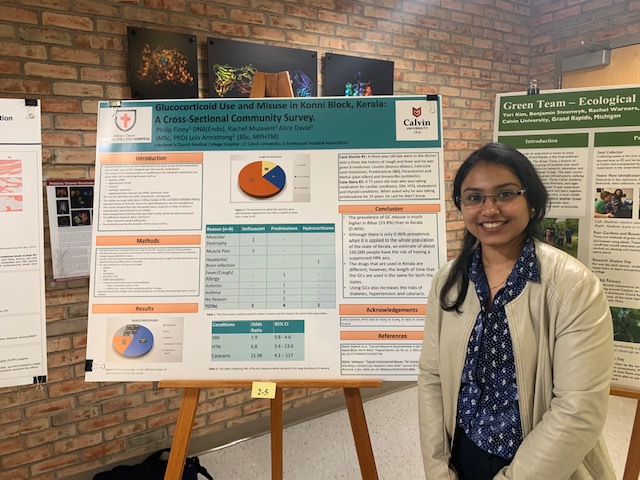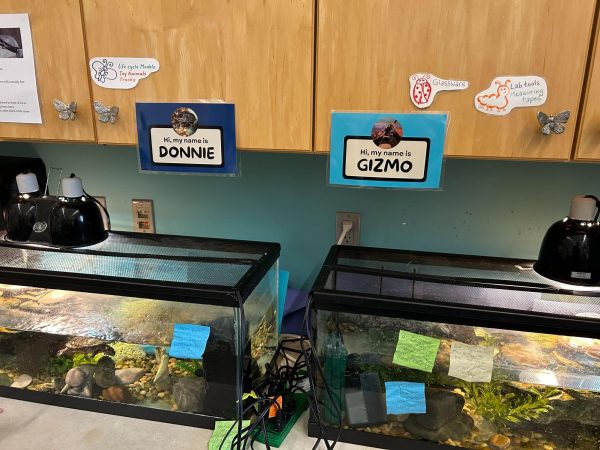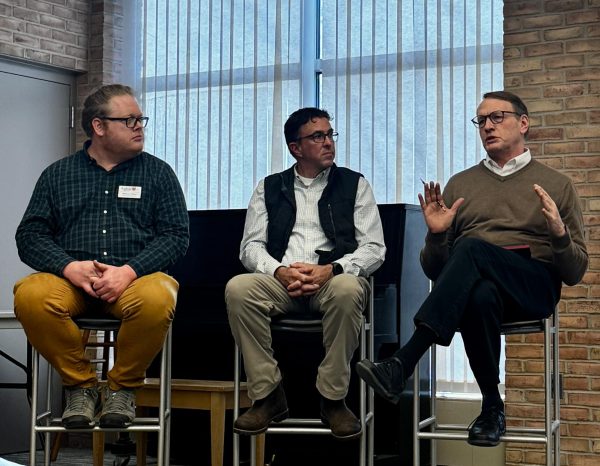Science students present research at poster fair
Rachel Mulavelil presents her poster on the misuse of medical steroids in India
What do the abuse of medical steroids, binary stars and automated navigational systems that could be useful in a post-nuclear fallout have in common? They were all topics that students at Calvin researched over the summer. Every year, over ninety students work alongside Calvin science professors to produce groundbreaking research. Attending the Science Division Poster Fair is one way to learn about these opportunities and see the types of exploration Calvin students are doing. Students presented their research in DeVries Hall covering a variety of scientific disciplines — engineering, math, computer science, biology, geology, geography, physics and astronomy, nursing, and psychology. The issues these students are facing — rare diseases, unclean water, medication misuse — are world problems, so their research’s effect does not end at the edge of campus.
One of the student researchers was Rachel Mulavelil who worked in Kerala, India to research the misuse of medical steroids. The normal use of steroids is for 3-8 weeks with monitoring by a medical professional; however, Mulavelil and her team discovered a multitude of cases violating this protocol. An example of this violation is a 3-year-old given 6 medications for a cough and a fever. Another example is a 75-year-old man being treated with a medication for conditions (cardiac, DM, HTN, cholesterol, and thyroid) he did not have, and taking those medications for 35 years. Mulavelil and her team had the opportunity to research these cases, to study the negative effects misuse causes, and to learn valuable lessons about the medical field. She states that she gained greater understanding of “how to treat a patient as a human being” and to practice good bedside manner. In this rigorous atmosphere of research in the medical field, she highlights that kindness is what makes the difference between her and the patients.
Another presenter, senior Michaela Blain shared her ongoing research in binary stars, a system of two stars in which one star revolves around the other or both revolve around a common center. Blain and her colleagues Lauren Henderson and Sarah Whitten worked alongside Professor Larry Molnar to develop a theory where the systems do not begin touching each other. Blain expressed that they had the opportunity to use supercomputer binary modeling software on real data to run their tests on the stars. This method made them “more confident than in the past” because now they had something solid in front of them. They developed their theory to conclude that the stars connect through a gravitational interaction by a third star, and are looking forward to continuing this research to discover the truth behind binary stars. Blain said that she gained more understanding of the “scientific process,” and that she is excited for her independent study continuing her research over this next interim.
Freshman Oscar Schott is an example of how Calvin offers students have opportunities for research, even before they arrived at Calvin. At the Science Division Poster Fair, Schott had the chance to share his experience as a research participant at the Space Systems Academic Group at the Naval Postgraduate School in Monterey, CA. His work consisted of developing a more efficient automated navigation system with high altitude payloads, and could be incredibly useful after the destruction of a nuclear EMP. He focused on the gyroscope and accelerometer to learn how to make the rate of angular turns an efficient speed. He also conducted turbulence testing to see the orientation of the system. From this experience, Schott learned that although he was “lost for awhile,” he can make progress by “just [doing] it” and by learning to be “pretty self-sufficient.” He has gained skills in programming, knowledge in the implementation of censors, and is looking forward to studying similar concepts at Calvin.
The Science Division Poster Fair is a way to learn about Calvin’s plentiful research opportunities, but its purpose is to invite other students to partake in the rewarding research Calvin offers.








